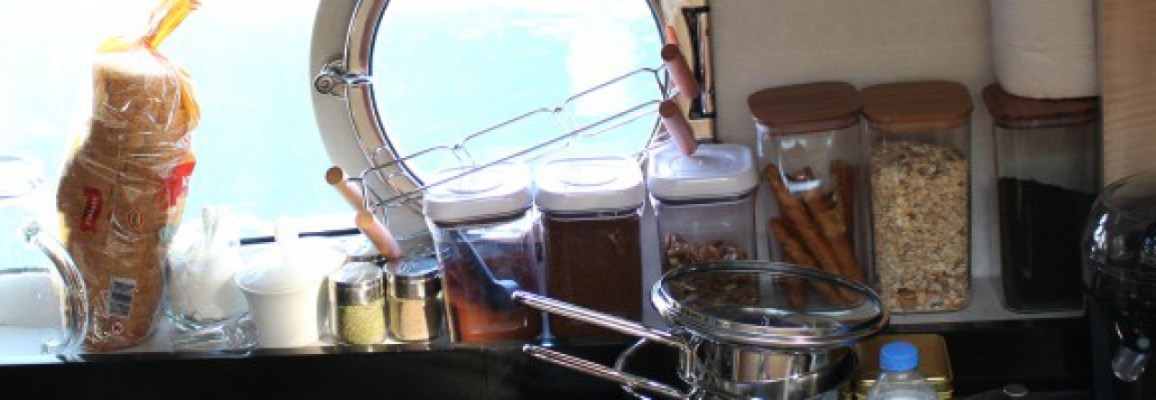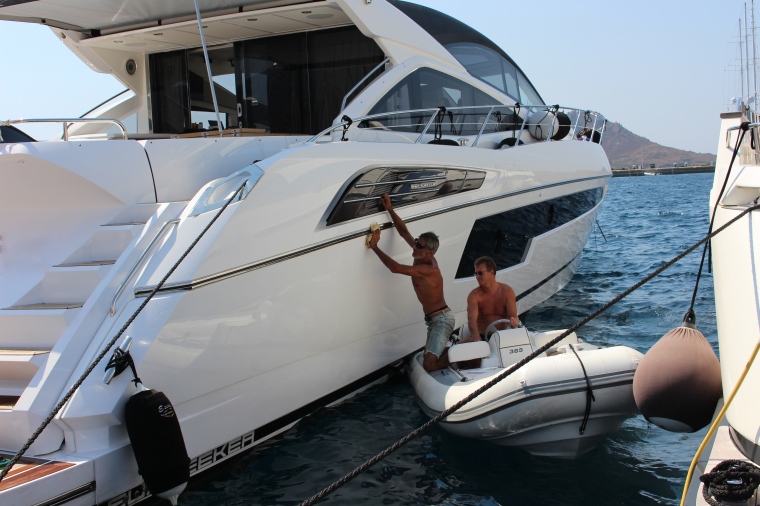We have been paying a day worker for the past few weeks to come and help on wash-down days. The skipper and I are not on a really big boat, but with 72 feet either side and a bit at the back, it’s still a lot for just two of us to manage several times a week.
It only takes one short trip out for the spray to dry to salt-rimmed splashes that encrust the glass of the saloon doors, the windows, the windscreen and the portholes, and which leaves the white gel coat of the hull sticky and dull. The salt evaporating on the stainless steel rails leaves a powdery residue that marks our shorts and shirts in streaks of white when we brush against the rail.
Wash down is one of the chores that unites the crews of all boats. We commiserate with each other over the length of time it takes, the heat of the sun on our backs and heads, the unrelenting tedium of stainless steel polishing and those owners who are oblivious to our labours – unless you miss a bit by the passarelle when they first step on board – then they notice.
The time that wash-down takes depends on the following criteria:
- The owners are off the boat for a couple of days
- The owners are off the boat for the day
- The owners are going out to lunch and will spend the afternoon in a restaurant/on the beach/at the shops
- The owners are asleep and might be going out to lunch
- The owners are asleep with no plans for the day
- The owners want to leave for a trip out on the boat as soon as they wake up
So it varies from a full wash down – to a quickie. If time is limited then wash down will be just enough to see out of the windscreen and a fast wipe around the bits that the owners will see when they first come on board or are sitting on deck. You can’t really wash down while the owner’s wife is having her breakfast within splashing distance of the hosepipe, sitting at the table amidst the debris of buckets and brushes, rub down mitts, chamois leathers, window wipers and deck scrubbers, and sweaty crew.
The most satisfying wash-down is when the owners are away and we have plenty of time to hose down, rub and polish the hull till it gleams; wash and polish the rails, and scrub the teak decks until every plank is the same uniform honey colour neatly divided by the dense black lines of sikaflex sealant.
So in order to maximise our efficiency, we recruited Kuby, a day worker, to become part of the team. Never mind that he’s always late. Or the reasons for his lateness:
‘I am so sorry, my lodgings at the pensione are too noisy for me to sleep.’
‘I am so sorry, I got in a taxi but it was going the wrong way so I took the bus.’
‘I am so sorry, I lost my sunglasses and I have a headache.’
‘I am sorry, I want to kill myself, I love you guys.’
Skipper remains unmoved.
…’OK Kuby, that’s um, lovely. Get a bucket can you?’
So: Wash Down. FIrst the decks, top to bottom, hosed down and scrubbed. Then the glass above deck: windows, hatches, portholes: hosed down, squeegied with a window wiper, the saloon doors done down again with Windolene and kitchen roll. Then the stainless steel on deck: rails, winches, locker lids, safety gate, cockpit table legs, all fixtures and fittings that shine…hosed down, chamois leathered, dried and buffed, polished and buffed again.
Then the hull. Hose down, dry with a chamois, go back over the entire hull with gel coat cleaner and buff to a polish. And do it all by hand stretching up, across, over and down from the precarious stability of bobbing about in the water in the tender. If you’re employed on a big boat it won’t take you long to work out the benefits of being able to handle the tender. The tender is the little boat that accompanies the big boat – ‘little’ being a relative term. Some tenders are virtually coracles with a 2-stroke seagull outboard engine on the back. Some, like ours, have a powerful inboard engine and are jet propelled; others are simply enormous: three times the length of our tender, but still serve as ‘toys in the garage’ to the super yachts they ferry backwards and forwards from. The grand benefit of being able to handle the tender is that you won’t have to be the one who washes: you can drive the boat while some other newbie (taller) deckhand gets the backbreaking job of hosing and wiping down the gel coat from gunwales to water line, hour after hour in generally hostile temperatures.
And that is why we have a Kuby.
Kuby arrived back in May, touting for custom on the pontoon. We kept it to polite nods to begin with, blossoming to a restrained wave and a low toned ‘Hi’. But then he started to stalk us. We’d see him in the supermarket, or hovering outside the bar when we stopped for a coffee. We’d be eating at a table at a pavement restaurant and he’d emerge slowly from behind a tasteful planting of potted shrubs, waving very discretely: a private understanding apparently developing between us. We were, he assured us in a fervent whisper, his brother and sister.
He brought us his C.V. A dog-eared A4 page of impressive voyages across oceans, typed in fractured but perfectly intelligible English, after the heroic-poetic style: ‘Many days were passing as we in the calms of the sea were making way until when the storms took us up and carry us to the island that is our hope and destination.’
 A coffee in the cockpit became a coffee with biscuits, then coffee with sandwiches. Then he finally wore us down, and with the news of the imminent arrival of the owners a day early, Skipper employed him for the day. He worked like a Trojan and went through the entire day on one round of tuna sandwiches, a handful of Pringles, and eight Nescafes with six sugar lumps per cup.
A coffee in the cockpit became a coffee with biscuits, then coffee with sandwiches. Then he finally wore us down, and with the news of the imminent arrival of the owners a day early, Skipper employed him for the day. He worked like a Trojan and went through the entire day on one round of tuna sandwiches, a handful of Pringles, and eight Nescafes with six sugar lumps per cup.
He is with us today for a nice thorough wash down with the luxury of absent owners over today and tomorrow. He now sports a version of our uniform: a pair of M&S beige shorts that Skipper bought him from the eponymous small outpost of that store in Bodrum, and a white T-shirt. A cigarette hangs permanently from his lip, probably the only thing that remains dry during a day of increasing dampness. He has somehow got bleach stripes on his shorts and his T-shirt is greying already from the relative white it was this morning.
We have given up on getting him to come to work early, before the sun is at its hottest, and expect him when we see him. We have however become stern about the coffee breaks, as the Trojan in him seems to have evaporated over the weeks. Skipper also took him to task this morning about his increasingly lengthy toilet breaks at the shower block in the marina, or as Kuby prefers to delicately refer to these, his trips to the ‘rest room’:
‘Half an hour? Seriously, Kuby? ‘
‘It is so very far away.’
‘It takes five minutes, at most, to walk there Kuby.’
‘I have many questions.’
‘What, on the toilet?’
‘It is my future I am thinking of. With my brother and sister.’
‘Kuby, that’s um, lovely. Get a bucket, can you?’


One thought on “The Day Worker”